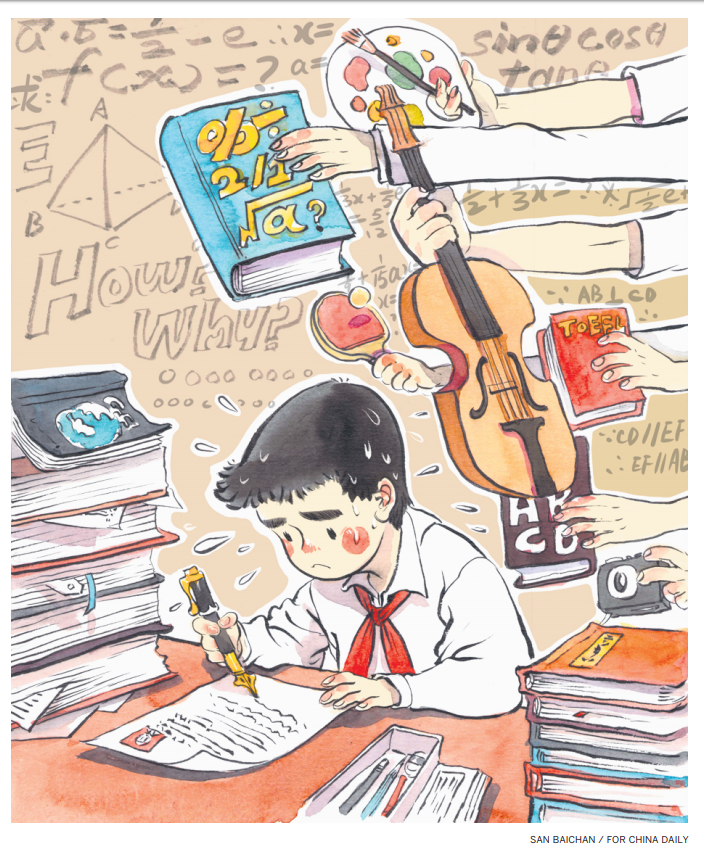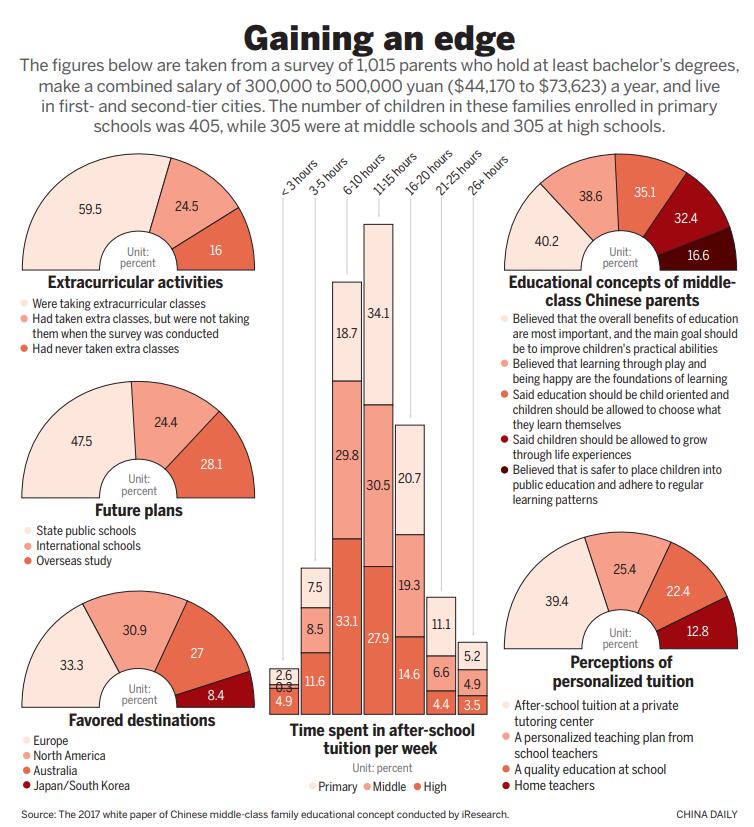Bilingual approach helps to broaden horizons
2019-02-20
More middle-income families are sending their children to international schools. Zhang Yangfei reports.
The young applicant from Shanghai appears a very strong candidate if you scan his glamorous 15-page resume.
He has excellent language skills: he can recite more than 100 traditional Chinese poems and read more than 500 books in English a year.
He excels at science: he loves solving Sudoku puzzles and enjoys reading about logical reasoning and geometry. Moreover, he has gained a basic grounding in the theories of density, magnetism and gravity through experiments.
He is also gifted at arts and sports: he plays piano, loves dancing and has produced more than 150 drawings and paintings. He also loves soccer and swimming, and has reached a high level of proficiency at Go, a strategic board game that is popular across Asia.
In terms of personality, he describes himself as vibrant, confident, curious, resilient, friendly and considerate.
However, this person is not a passionate job seeker-instead, he is a 5-year-old boy hoping to win a place at the prestigious Shanghai Starriver Bilingual School.
When the resume was leaked online in early November, it sparked heated debate. Some netizens said it outshone the resumes of many first-class university graduates, while others doubted if such a busy child could really be happy.
However, the boy's family is just one of many affluent households in which the parents are turning away from China's traditional exam-oriented education system and embracing more international and diverse methods.
Relative normality
Though the length of the boy's resume and the experiences listed may appear exceptional or even daunting, they are actually relatively normal among applicants for private bilingual or international schools, according to Li Ai, director and founder of Beijing Blossoming Kids Co, a provider of after-school education in the capital.
Li, who spent more than 10 years as a teacher at an international school in Beijing, said that after 2008 she noticed a sharp rise in the number of Chinese, as opposed to Western, children joining her class.
Recognizing the burgeoning private market, she left the school in 2016 and founded her company to offer extracurricular classes in English and math to help Chinese children better adapt to external courses such as the international baccalaureate diploma program, which is used across the globe, and A Levels, which are primarily used for university entry in the United Kingdom.
The company also helps to prepare applications to international schools in China. According to Li, some students' resumes can easily stretch to 10 to 20 pages and sometimes parents even attach a video.
"When parents come and tell me which school they want their child to attend, I ask them if the kid has studied piano or general arts, and question them about the child's interests and how they display them," she said.
An interest in such activities as Peking Opera and charity art exhibitions are among the must-haves for a child to secure a place at a select international school, she added.
Though some observers may be concerned that these experiences will add to the burden on youngsters, many parents believe that a wide range of skills provides more opportunities for children, whose potential talent can be better discovered this way, compared with exam-oriented education.
"We are not asking him to be an expert in every area of his studies. We just want him to get a taste of various subjects so he will be more ready to make his own choices in the future," the parents of the 5-year-old boy wrote in a note in his resume.
Discipline, competition
The Chinese education system has long been known for strict discipline and intense competition. Every June, more than 9 million students sit the gaokao, the demanding three-day national college entrance exam that determines the university they will attend and effectively seals their career path and social status.
The competition starts at a very young age as parents scramble to earn their child a spot at the best kindergarten in their city, which, in turn, provides entry to top-performing primary and secondary schools and eventually gives the child an advantage in the gaokao.
From International Math Olympiads to calligraphy contests and spoken English competitions, students at every level fight hard to pocket as many awards as possible to win the favor of their dream schools.
"This is very typical of Chinese-style early education," said Xiong Bingqi, deputy president of the 21st Century Education Research Institute.
"Not wanting to be left at the starting line, many parents begin to cram their children with extracurricular courses as early as possible so they get an edge over their peers."

Shanghai resident Jia Qian said her eldest daughter, who is a seventh-grader at the international bilingual YK Pao School, had a full schedule every day during summer vacations in Grades three to five, taking extra courses for Math Olympiads, English and other competitions.
"We probably only rested for three days during the 60-day summer vacations. Both our child and we parents were very, very tired. I nearly had a nervous breakdown," Jia said.
She wanted her daughter to attend a State secondary school, and then send her overseas for undergraduate studies. However, exhausted by the competition, Jia decided to send the girl to a private school.
"If the child is going overseas in the end anyway, why not consider an international bilingual school?" she said.
The girl is still busy most of the time, with lessons in French, piano, flute and tennis, plus preparatory classes for the Test of English as a Foreign Language and debates in English.
Jia said these activities will allow her daughter to decide what she wants to do in the long run. "If she had continued on the State path, at this grade, she would have tons of (academic) homework. But now, she has time to think about why she is learning the things she is learning, which is a good start," she said.
Zheng Yanhong, a mother in Beijing, also opted to send her daughter to an international school after a short time at a State primary.
"Today's public schools follow the same teaching approach as the ones we attended when we were young. They demand strict discipline and high academic performance, whereas the international school pays more attention to the child's personality," she said.
She added that the international school allows her daughter to gain a wide range of skills in addition to academic subjects by offering a greater variety of courses such as handicrafts, art, musical performance and teamwork, which carry equal weight in the curriculum as academic classes.
"It makes the child realize that studying is about more than just learning math, Chinese and English and getting high scores. It creates a more practical, international mindset," she said.
With China's middle-class growing and becoming more affluent, the number of parents who are willing and financially able to send their children to private schools is rising rapidly.
Statistics released by the Ministry of Education in July show that enrollment in the private sector rose to 1.4 million students at primary level and 2.1 million at secondary level last year, accounting for year-on-year rises of 7.9 percent and 10.8 percent respectively. In 2013, the numbers were 3.6 percent and 2.6 percent.
David Mansfield, executive headmaster of YK Pao School in Shanghai, said China's growing engagement with the global marketplace is one of the reasons more parents are opting for the bilingual international education route.
They want their children to continue to feel fully Chinese, but also be capable of building businesses overseas if they wish, in neighboring countries that are participating in the Belt and Road Initiative and also in the United States, Europe and Africa, he said.
That will not only require academic success, but also the development of "soft skills" such as problem solving, analytical thinking and the ability to present themselves effectively and champion their ambitions, according to Mansfield.
As an education professional from the UK, Mansfield said that in the future education will become more international, which will create a global educational community that will foster local talent across the world.
He advocated the development of dual language immersion programs where foreign students will connect with a Chinese environment to learn the language and culture so they will be better able to communicate and learn alongside their Chinese counterparts.
Equally, the programs will allow young Chinese to learn English and develop international awareness from their Western peers.
International schools are often seen as skills-oriented, while public schools are usually regarded as knowledge-oriented. Chinese families are now beginning to realize that the best education in the world is actually the combination of both approaches, of East meets West, he said.
The Chinese education system can help students grasp the key concepts of knowledge and build a solid foundation on which they can then benefit from Western approaches, such as group work and project-based learning to boost their critical thinking abilities and creativity, he added.
"I don't think you can just simply say it's either one or the other-it's both," he said. "In fact, a lot of the good public schools in Shanghai and other parts of China are embracing the Western style alongside the more traditional Chinese style, and I think that's where all good schools are heading."
If you would like to know more about the China Marketing intelligence, please contact This email address is being protected from spambots. You need JavaScript enabled to view it. for more details.
(Source:https://www.chinadaily.com.cn/a/201901/11/WS5c37d996a3106c65c34e3cbc.html)
 京公网安备 11010102001951号
京公网安备 11010102001951号